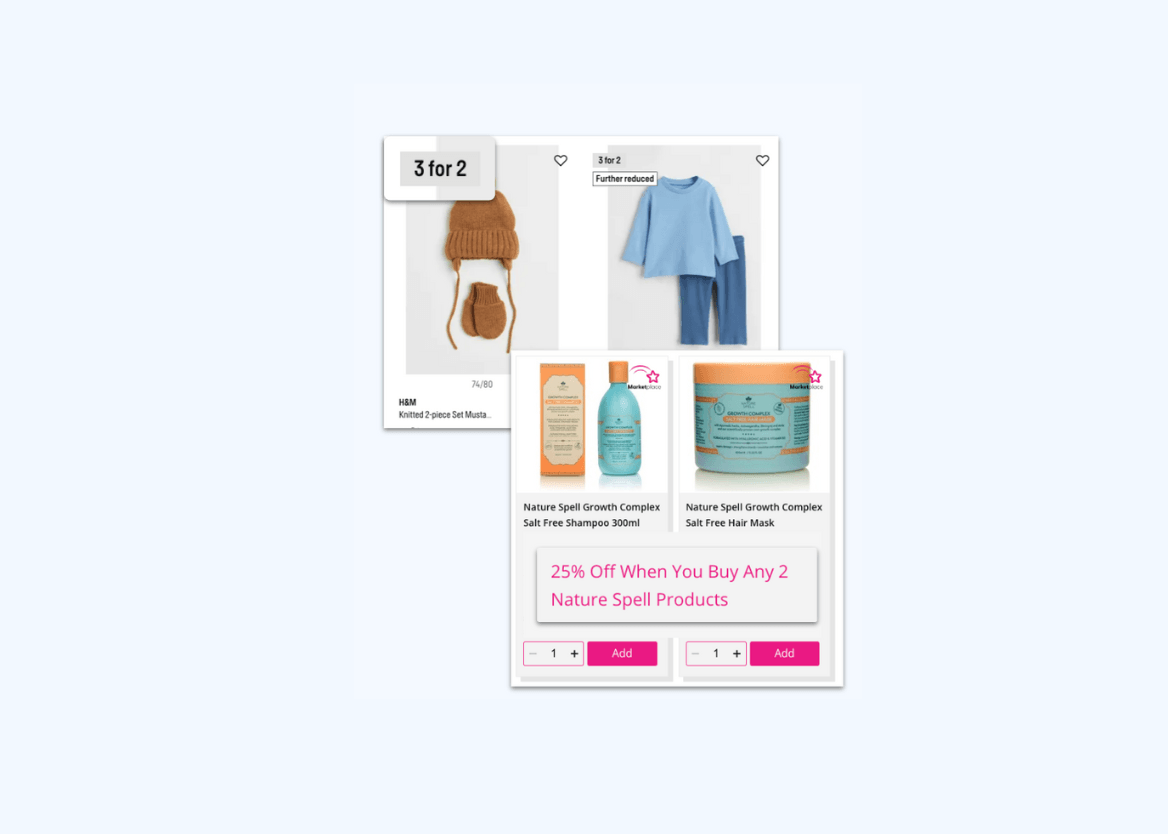The Truth About Marketplace Cannibalization

While marketplaces outpace the growth of overall eCommerce by 6x, concerns about market cannibalization still linger. But the growth of several enterprise businesses worldwide that operate marketplaces, like B&Q, MediaMarkt, URBN, and Conrad Electric, debunk the myth of cannibalization.
“Having more choice and more products generates more organic traffic and a larger number of customers who visit our site. When they visit they don’t just buy third party products but also first-party products, so it benefits not just the marketplace but the overall core business,” says Marc Vicente, Group Digital Director, Kingfisher (parent company of B&Q).
B&Q, a global DIY and home improvement retailer, has achieved remarkable results since launching its marketplace, with 50% of marketplace customers being new and 10% of them subsequently making a first-party purchase.
What is market cannibalization?
Market cannibalization describes a loss in sales following a company’s introduction of a new product or service that replaces one of its own. In online marketplaces, adding external products can create competition, lowering sales of the retailer's higher-margin inventory.
The reality is, in a hypercompetitive eCommerce environment, the real threat to the bottom line isn't cannibalization – it's direct competition. If your website doesn’t have exactly what customers are looking for, they’ll simply move on. By working with trusted third-party sellers to expand your assortment, you can mitigate this risk and maintain strong customer loyalty.
Adopt a marketplace strategy to drive growth
Integrating an online marketplace into your first-party eCommerce presents your customers with an endless digital aisle that’s efficient, easy to navigate, and delivers exactly what they want - all without compromising your brand identity. Rather than bearing the entirety of inventory risks and costs alone, embracing a blend of owned and unowned inventory can yield greater value for your business, such as:
More traffic to online and offline channels
Increased customer lifetime value
A boost in profitability
Opportunities to test new brands and categories
Plus, an online marketplace is a unique lever to enhance your brand’s assortment strategy with full control. Using these advantages of the marketplace model, you’re able to keep customers loyal and coming back to you for all their needs.
MediaMarkt: Increasing brand awareness and relevance with a marketplace
European consumer electronics brand, MediaMarkt, implemented a marketplace model to expand its product assortment and offer relevant products to new and existing customers.
“When you add core products to the marketplace you're more relevant in your category. You're more relevant to the customer. You have better visibility and more traffic from outside,” says Marius Lueckemeyer, Chief Digital Officer at MediaMarkt.
MediaMarkt, concerned about cannibalization, conducted an experiment by encouraging one of its existing retail technology vendors to also become a marketplace seller. The test would measure whether the introduction of marketplace products would correspond to reduced sales from wholesale products from the same vendor. The vendor expanded its offering by 72%, making its full assortment available to MediaMarkt customers.
The Result
By the end of the 12-month trial, the vendor's revenue grew by 93%, with two-thirds of the growth attributed to the new marketplace assortment. The retail segment also saw a 40% increase in revenue. In other words, marketplace items increased overall eCommerce revenue, including sales of MediaMarkt’s owned inventory. MediaMarkt is also on track to generate €750 million+ in gross merchandise value in 2025.
“This seller generated completely new revenue from the marketplace, and at the same time, the existing retail assortment markedly did not suffer from cannibalization, but rather thrived as well,” Lueckmeyer says. “It basically showed that we all benefit.”
URBN: Complementing an existing product assortment
URBN is home to global brands like Anthropologie, Free People, and Urban Outfitters, each renowned for its distinctive blend of clothing, footwear, accessories, and home decor. Embracing a highly-curated marketplace model across its brands enables URBN to effortlessly exceed customer expectations at scale.
“One of the biggest competitive advantages that we saw in having a marketplace is just how quickly you could hit the market with products that we've never been able to provide to our customers before for varying reasons, including logistics, price point and general inventory risk,” says Maria Wodicka, marketplace program manager at URBN.
The Result
A marketplace model enabled the URBN team to be more flexible to sell into new or existing categories and diversify their overall product assortment. The team also had a chance to test out new products and categories, without taking on the costs and potential risks of owned inventory. Rather than minimizing URBN’s owned inventory sales, a marketplace model prompted consistent growth across the entire business.
“We've aimed to have our marketplace be highly complementary to our traditional assortment. We really wanted the marketplace to grow in conjunction with the rest of the business. We found that through deepening the assortment, customers were just purely buying more in general in a single session and bringing in new customers,” says Wodicka.
Paint, wallpaper, and children’s clothing are some of the new categories the team at URBN has successfully launched through their marketplace model.
Conrad Electronic: Enhancing value through expanded choice
Conrad Electronic, a premier electronics, and technology wholesaler had a vision: To be the “one-stop shop” for all their customers’ needs. While they knew where they wanted to end up, they had an uphill climb to get there. After a century of innovation, Conrad had a catalog of more than 800,000 products and services. While extensive, an internal study revealed they needed millions of new products to cover all of their customers’ core needs.
With the online marketplace platform, Conrad took the opportunity to be the entry point for an entire ecosystem of trusted electronics and technology sellers. Today they offer more than 20 million product offers and services (and counting), without having diminished the quality and reliability they’re known for. A marketplace model made this expansion possible and has exceeded customer expectations.
“We did not build a marketplace to expand our product range by only adding products that we were not selling ourselves. Our marketplace is very clearly focused on both widening and deepening the product range. Therefore, new products, as well as increasing availability of existing products,” says Ralf Buehler, CEO at Conrad Electronic.
The Result
Through this effort, Conrad has more than doubled their marketplace's business every year, one year after the other. These marketplace sales lift up the owned inventory business, too: more than 50% of Conrad’s online transactions are mixed baskets (consisting of a Conrad item and a marketplace item). While impressive, Conrad believes they’ve still only scratched the surface when it comes to onboarding new sellers, products, and services.
Boost Customer Lifetime Value with a Marketplace
The results of an effective marketplace strategy can have a long term impact on your business, ultimately increasing your overall customer lifetime value (LTV). Here’s a quick formula to determine the positive impact of your marketplace strategy:
[Purchase Value x Purchase Frequency x Customer Lifespan] - Customer Acquisition Costs
Multiply the purchase value, purchase frequency, and customer lifespan together and then subtract the customer acquisition costs from that number. The number you are left with is the average customer lifetime value. As you implement a marketplace model, customers will see more products that are relevant to their needs, while can positively impact the other components of their lifetime value.
Leveraging the marketplace opportunity empowers your business to broaden its customer base, enhance loyalty, and elevate the overall online shopping experience. In doing so, you’ll put any concerns about marketplace cannibalization to rest and improve the overall eCommerce experience.



